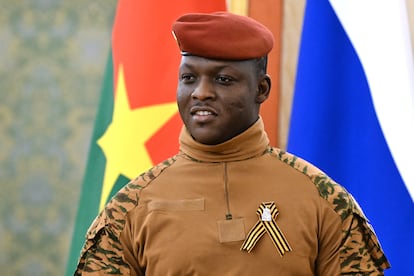"We will continue to exist, but in the private sphere": Burkina Faso's LGBTQI community reacts to the new homophobic law.


"This week we're going to stay home and keep a low profile on the streets." The young woman who uttered this sentence, a 30-year-old Burkinabe resident in Ouagadougou and member of the LGBTQI community, does so on condition of anonymity, after the Transitional Legislative Assembly (ALT) of Burkina Faso unanimously approved (71 votes in favor) a law last Monday that criminalizes homosexuality with imprisonment and fines. The body, which exercises the functions of a parliament but whose members were directly appointed by President Ibrahim Traoré, has thus given the green light to the draft amendment to reform the Family and Persons Code , presented in July 2024 by the military junta that has ruled the country since the coup d'état three years ago.
The Minister of Justice and Human Rights, Edasso Rodrigue Bayala, announced the news last Monday during the evening news broadcast on Burkinabe public television (RTB), where he described homosexuality as "bizarre behavior." So far, no details of the law have been made public, and the minister has only stated that anyone engaging in "similar practices" will be reported and brought "before a court."
However, according to a draft of the Family Code reform, to which EL PAÍS has had access, "all behaviors that may promote homosexual and similar practices" will be punished with prison sentences of between two and five years and fines of between two and 10 million francs (between 3,000 and 15,000 euros). The text also states that in the case of a repeat offense, "the penalties will be doubled" and that, if the convicted person is a foreigner, "they may be expelled from the national territory." "We will accompany them to the border," the minister said in this regard.
The penalties will be doubled in case of repeat offenses and convicted foreigners may be expelled.
Burkina Faso joins the list of African countries that criminalize homosexuality (33 out of 54, according to ILGA , the International Lesbian, Gay, Bisexual, Trans and Intersex Association). Some of them carry prison sentences and even the death penalty, as is the case in Mauritania, Somalia, Uganda , and 12 regions in northern Nigeria. South Africa is the only country on the continent that recognizes marriage, adoption, and civil unions between LGBTQI people. In recent years, Botswana, Gabon, and Angola have also amended their penal codes to decriminalize homosexuality.
“Right now we're in shock ,” continues the woman, who prefers to remain anonymous. “We still don't quite understand how the law will be applied because it seems they want to criminalize the public promotion of homosexuality, not the fact of being homosexual,” so it will be necessary to wait for the full publication of the law, she continues. However, she is concerned that the text legitimizes homophobia. “For now, we're going to avoid going to some places that are currently being attacked on social media,” explains the young woman.
A “Burkina Família”The decision comes at a particular political moment in Burkina Faso, where military authorities have launched a cultural campaign against what they consider an imposition of foreign values, ignoring the fact that European and American far-right groups , such as the World Congress of Families and CitizenGo, have been promoting homophobia in African countries for years. "This new code respects cultural values and the desire to build a Burkinabe family," Bayala said.
We still don't quite understand how the law will be applied because it seems that what they want to penalize is the public promotion of homosexuality and not the fact of being homosexual.
Young Burkinabe woman who prefers to remain anonymous
The new text includes other reforms in line with the supposed recovery of the country's traditions, such as the recognition by the Civil Registry of traditional marriages celebrated in rural areas, the impossibility of obtaining nationality immediately after marriage, and the reduction of the legal age for marriage from 20 to 18.
Sophia (a fictitious name to protect her identity), a 34-year-old lesbian woman, no longer responds to calls or messages since the law was passed. This young foreigner found a welcoming country in Burkina Faso almost a decade ago, but is now considering how to leave after receiving threats on social media in late July for her membership in the LGBTQI community. Her journey to find a safe place to live in West Africa began when she was a minor. But a year ago, when the military junta threatened to pass the homophobic law, she had already begun to feel the hostility toward her community: “Before, in Burkina Faso, it was best to stay unnoticed, but generally, no one would say anything to you if you didn't bother anyone,” she recalls. However, in recent times, the LGBTQ community has been forced to protect itself from homophobic attacks and has organized private meetings where phones are not allowed or, for example, the meeting location is not disclosed until the last minute.
“Homosexuals will continue to exist, but now we'll be forced to remain private,” says a member of the collective. He exclaims: “When I see so much news and the press talking, I think maybe it would be better to remain discreet. We hide, but we continue to live!”
EL PAÍS

.jpg&w=1280&q=100)


